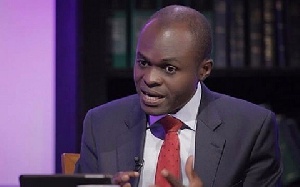 Private legal practitioner, Martin Kpebu
Private legal practitioner, Martin Kpebu
A private legal practitioner Martin Kpebu has called for an amendment of the electoral laws to allow respondents in an election petition to be served electronically.
Mr Kpedu said on the Key Points on TV3 Saturday, January 2 that serving the parties electronically will help in adjudicating the matter within the time period set out under the new rules for the justices of the Supreme Court.
A new directive has been given to the justices of the apex court in Ghana to hear any election dispute within 42 days from the day it was filed.
In the last election petition hearing after the 2012 polls, it took the highest court of the land some nine months to arbitrate the petition.
After the 2020 elections, the Presidential Candidate of the National Democratic Congress (NDC) filed a petition on Wednesday December 30, 2020 which seeks, among other things, a rerun of the presidential elections, asking the Court for an order to restrain Nana Addo Dankwa Akufo-Addo, the Second Respondent, from holding himself out as President-elect.
Speaking on this development, Mr Kpebu told host of the Key Points, Abena Tabi that “If the parties and the court intend to insist on the time that have been allocated it will mean in practical terms we will go beyond 42 days . As we sit now since the president has not been served they can’t start. So it means that if it takes one week or seven days to serve the president, it means you have 42 + 7. If the judges want to give us 42 days then they may have to give up part of their time.
“Moving forward the next time we are going to have an election, there should be a column where we will say that the candidates should provide their email address for service in the event of an election petition so that electronically you can be served. I can’t imagine trying to get security clearance to go and serve him. It is ridiculous.”
For his part, a former Deputy Attorney General Dr Dominic Ayine said the NDC’s petition can be heard within two weeks just as what happened in Kenya.
He said that the 42-day period set out by the new rules for the Justices of the Supreme Court is too long.
Dr Ayine, who is also Member of Parliament for Bolgatanga East told host of the Key Points Abena Tabi that “The lessons that we learned from the 2012 petition was that we went through a trial of eight months, we held the country spellbound to television sets on a daily basis for eight months and so we leant a very difficult lesson from that. That is how come his Lordship Justice Yoni Kulendi was making reference to the new rule that has stipulated a shorter time period of 42 days for the petition to be heard."
“Whether the respondents have been served with the petition I haven’t been able to check that but I think it is very important because time is beginning to run. They have to be served and personally to. In the case of the Electoral Commission, because it is an independent commission any principal officer of the Commission can be served with the petition and can receive it.
“In the case of his Excellency the President as the Second Respondent, he must be personally served. You can’t just go and leave it at the Flag Staff House or his residence at Nima and then expect that he will be duly served. So, we have some work to do. I hope that the panel in this case will find, during the case management, a more expeditious way of getting us into a shorter period . In fact I don’t want us to even go the 42 days, it is too long. The Kenyans did it in two weeks.”
Meanwhile the justices of the Supreme Court have allayed fears that they are going to rush the hearing in view of the shorter time period.
Asked whether the justices are not snowballing the wheel of justice with this directive, while speaking in an interview with TV3’s Thomas Adotei Pappoe, Justice Yonny Kulendi said on 29th November 2020 that “That is not the case. With our experiences in the last election petition, parliament by law, has set timelines for the resolution for future presidential election disputes and so that timeline of 42 days within which any presidential election disputes ought to be resolved was not set by the judiciary .
“It is set by law. It is an amendment to the existing legislation that makes that provision and indeed, the law attaches a schedule and the schedule sets out timelines within which the various processes that will culminate in a hearing.”
He added “The timelines provided in the legislative instrument are consistent with the timelines by law including the constitution.
“The purpose of this review is to update it and reflect all the amendment to the law and the new laws that have been passed.”
He further explained that the Chief Justice places high premium on elections in Ghana because they form an important aspect of Ghana’s democracy.
“It is process by which we exercise our franchise and invest in a selected group of people or invest in one man all executive powers of the republic.
“It has always been the case. And that seriousness and that priority that the judiciary attaches to election related disputes and their adjudication is a front burner issues for his Lordship the Chief Justice and the entire judiciary at the moment.”